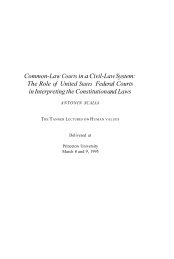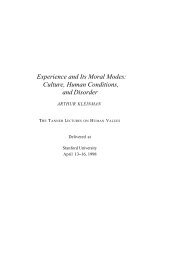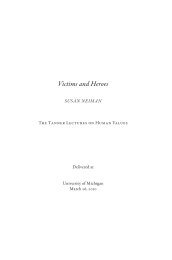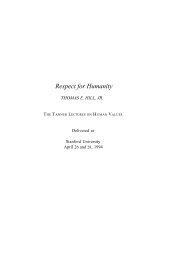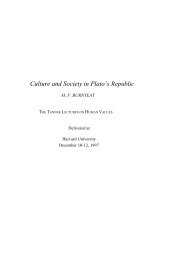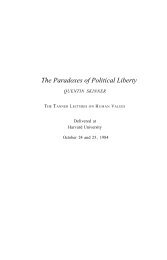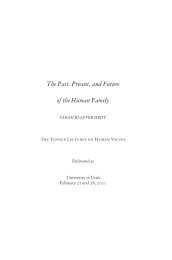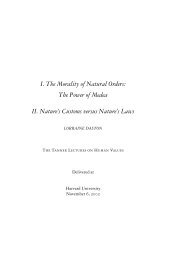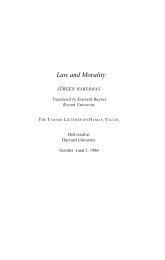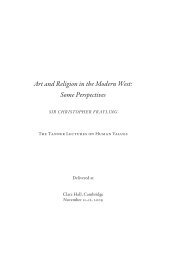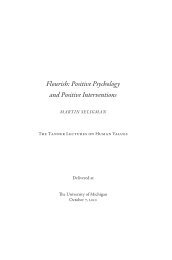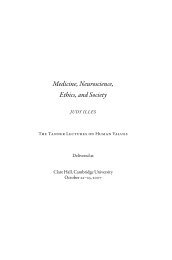Muguerza, Javier - The Tanner Lectures on Human Values
Muguerza, Javier - The Tanner Lectures on Human Values
Muguerza, Javier - The Tanner Lectures on Human Values
Create successful ePaper yourself
Turn your PDF publications into a flip-book with our unique Google optimized e-Paper software.
106 <str<strong>on</strong>g>The</str<strong>on</strong>g> <str<strong>on</strong>g>Tanner</str<strong>on</strong>g> <str<strong>on</strong>g>Lectures</str<strong>on</strong>g> <strong>on</strong> <strong>Human</strong> <strong>Values</strong>sought (even “truths by c<strong>on</strong>sensus”) and the best refutati<strong>on</strong> of acognitivist positi<strong>on</strong> such as this is the <strong>on</strong>e developed by PaulLorenzen, who encapsulates it in the precept “You ought to seek<strong>on</strong>ly the truth,” where the “ought” removes us from the cognitivistperspective and places us in a normative and, finally, anethical <strong>on</strong>e. 63But, in fact, there would be no problem - that is,no new problem-if, for the phrase “cooperative search fortruth,” we simply substituted “search for a c<strong>on</strong>sensus.” With thecharacterizati<strong>on</strong> understood this way, we can also understandbetter why Habermas wants to c<strong>on</strong>sider “juridical proceduralism”as c<strong>on</strong>tinuous with ethical proceduralism. “It is not a questi<strong>on</strong>,”he tells us, “of c<strong>on</strong>fusing law and ethics (Freilich dürfen dieGrenzen zwischen Recht und Moral nicht vermischt werden) .” 64As instituti<strong>on</strong>alized procedures, the juridical <strong>on</strong>es may aspire to a“completeness” that would not be attainable for ethical procedures,whose rati<strong>on</strong>ality is always an “incomplete rati<strong>on</strong>ality”that depends <strong>on</strong> the perspectives of the interested parties. Not tomenti<strong>on</strong> the greater degree of “publicity” of juridical procedures,compared with the “privacy” of an internalized and aut<strong>on</strong>omousmorality; or the instrumental c<strong>on</strong>diti<strong>on</strong> of law when used toachieve this or that political goal, which locates law “betweenethics and politics.” But, be that as it may, there is also, he warnsus, an “ethics of political resp<strong>on</strong>sibility,” and law and ethics “not<strong>on</strong>ly complement each other but <strong>on</strong>e can even speak of theirmutual coupling,” such that “procedural law and proceduralizedmorality could c<strong>on</strong>trol <strong>on</strong>e another.” 65But what is the ultimatemeaning of this “c<strong>on</strong>trol <strong>on</strong>e another”?As he himself says, Habermas does not c<strong>on</strong>fuse ethics andlaw, but he does mix them when he speaks not <strong>on</strong>ly of their“complementarity” (Ergänzung) but also of their “mutual cou-63P. Lorenzen, Normative Logic and Ethics (Mannheim, 1969), 74.64 Habermas, “Wie ist Legitimität,” 13.65 Ibid., 14-15.



